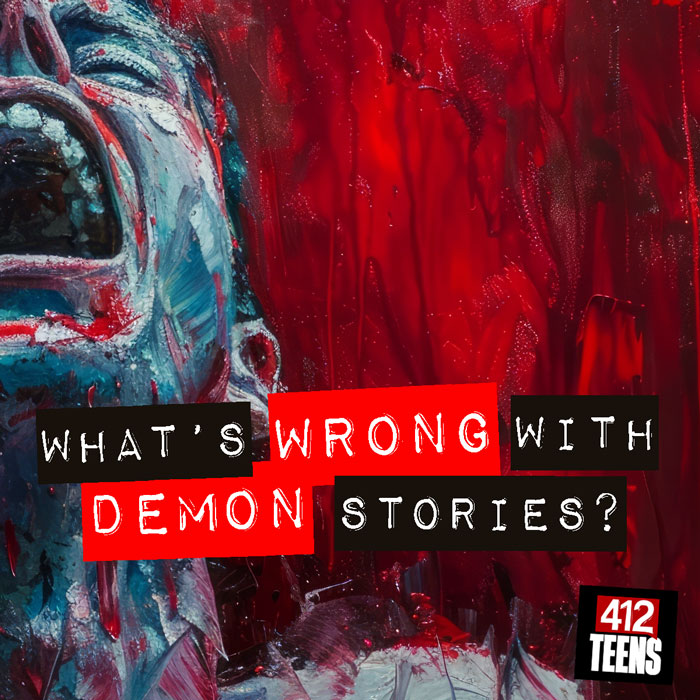What's wrong with stories about demons?

"Take no part in the worthless deeds of evil and darkness; instead, expose them." —Ephesians 5:11 (NLT)
The spiritual realm holds a weird fascination for humanity. Maybe it's because we can only glimpse through the veil of our own reality, and that makes us curious about what's "beyond." For thousands of years, people have created and told stories about supernatural beings—the ones they worship, those of other religions, and those that are a product of human imagination.
Japanese culture calls most spiritual creatures "demons" in their respective folklore and mythologies—regardless of whether they're considered evil. Various anime and manga storylines label both benevolent and malicious supernatural beings as "demons." Western culture is filled with books, TV shows, and movies about the Greek and Norse gods, which we find in certain popular superhero stories.
For the most part, this is kind of entertainment can simply be approached with common sense and spiritual discernment. When we're watching Thor fight Thanos on the big screen, that's not the same as worshipping a Norse god. When we root for a helpful "fire demon" in a Ghibli film, we aren't glorifying fallen angels. But when it comes to depictions of biblical demons, that's a bit of a different situation, because those demons are undeniably and completely real.
Demons as Entertainment
When fiction brings to life biblical demons, fallen angels, or Satan himself, those portrayals can be extremely dangerous—especially when they're written sympathetically. Crowley from Good Omens (2019) is an example. The title character in Lucifer (2016) is another. Real demons do not have sympathy or compassion for people, they don't befriend angels, and they have no second chances for redemption (Ezekiel 28:14-19).
The TV show Supernatural (2005) and the animated film K-Pop Demon Hunters (2025) both claim that demons were once humans. They assert that some demons are tortured in hell while others make contracts or do "work" on earth. One of the more dangerous assertions is that demons can be "cured" and returned to their human state. These ideas are 100% false. Humans live once and then die once (Hebrews 9:27).

In the movie Dear Santa (2024), a dyslexic boy tries to write to Santa but ends up reaching a demon instead. The film has been called "a nice blend of comedy and heartfelt relationships"1. One reviewer stated that Jack Black played the demon as "strangely likable," sincere, and an "endearing mentor"1. None of those terms describe real demons or what they really do.
In the manga series Black Butler (2006), a handsome demon is the butler for a 12-year-old boy. In return for helping the boy seek revenge on his torturers, the demon is allowed to consume the boy's soul. Making a "deal with the devil" is a concept from the classic Germanic legend of Faust (16th century). While the Bible does show that Satan tried to make deals with God and Jesus at different times (Job 1:9-11; Matthew 4:8), there's no evidence that he or his demons would have any interest in making "deals" that benefit humans in any way.
The Problem with Demon Stories
Without strong spiritual discernment, fictional depictions of demons can be dangerous for our spiritual growth and understanding of reality. At fiction's most benign, it treats demons as jump-scare horror fodder. At its worst, fiction portrays demons as friendly, romantic, comedic, or even redeemable. Real demons are none of those things.
The truth is that demons only interact with humans to attempt to manipulate and destroy us. They take our attention—and worship—that rightly belongs to God (Deuteronomy 32:17). They influence human systems of power to create chaos, war, and injustice (Daniel 10:13; Ephesians 6:12). Demons are not good, sexy, or sympathetic. And they don't care about humans in the least.
Their choice to reject God is so complete that they cannot be saved. They know their destiny is eternal torment, and their goal is to bring as many people with them as they can (Matthew 25:40; Revelation 20:10-15; 1 Peter 5:8).
We would be wise to avoid wasting our time and empathy on demons—especially when there are many, many humans in the world who DO deserve our energy and empathy and DO have a chance to be redeemed (Colossians 1:13-14).
"Be sober-minded; be watchful. Your adversary the devil prowls around like a roaring lion, seeking someone to devour." —1 Peter 5:8
REFERENCES: 1. Pettis, Caillou. "Dear Santa Review: A Devilishly Festive Comedy with Heart." https://www.themovieblog.com/2024/12/dear-santa-review-a-devilishly-festive-comedy-with-heart/ December 3, 2024.
ALSO SEE:
- What is spiritual discernment?
- How can I get better at spiritual discernment?
- Are demons real?
- What do demons do?
- The Truth About Demons
- Is there evidence of demonic activity in the world today?
- Should a Christian watch anime?
- What does the Bible say about witchcraft?
- What does the Bible say about divination?
- What happens after death?
- How do I keep my thoughts godly?
- What is the full armor of God?
- A Study on "The Screwtape Letters" by C.S. Lewis


TL;DR
In the Bible, demons are pagan gods who demanded sacrifice. They are portrayed as nothing but evil. Today, demons have overtaken various genres of entertainment—from horror to adventure to romance. Demons are not good, sexy, or sympathetic. And they don't care about humans in the least. They know their destiny is eternal torment, and their goal is to bring as many people with them as they can (Matthew 25:40; Revelation 20:10-15; 1 Peter 5:8). We would be wise to avoid wasting our time and empathy on demons—especially when there are so many humans who DO deserve our energy and empathy and DO have a chance to be redeemed (Colossians 1:13-14).
